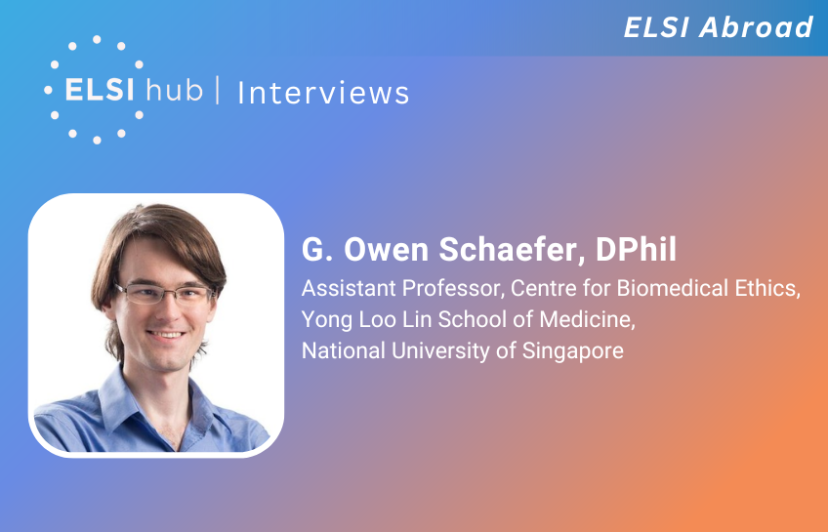
ELSI Abroad: Spotlight on Singapore
CERA is pleased to share a set of interviews that aim to foster a global perspective on the ELSI field of study and inspire information sharing and collaboration across national borders. So far, we have heard a range of responses to our inquiries about the most important ELSI issue in each country right now—from defining an ethical, participative, and functional approach to including equity-seeking population groups in health research to the use of whole genome sequencing in newborn screening. However, all interviewees have endorsed the idea that our understanding of most, if not all, ELSI issues could benefit from multi-country deliberation, whether to understand the limitations of national approaches to a problem or compare our perspectives on an issue as a way of refining our positions. All interviewees have expressed interest in collaborating with their international colleagues.
In this fifth installment of our series, G. Owen Schaefer, D.Phil., an Assistant Professor at the Centre for Biomedical Ethics (CBmE) in the Yong Loo Lin School of Medicine at the National University of Singapore, shares insights into ELSI research in Singapore. Prior to his current position, he wrote a dissertation on moral enhancement at Oxford and completed a post-doctoral fellowship at the Oxford Centre for Neuroethics funded by the Wellcome Trust. Dr. Schaefer also previously worked as a pre-doctoral fellow in the Department of Bioethics at the National Institutes of Health.
CERA: What inspired you to focus your work on the ethical, legal, and social implications of genetics and genomics?
Dr. Schaefer: More broadly—my background is in philosophy. One of the things that attracted me to bioethics is the opportunity to apply theoretical philosophical tools to real-world issues. ELSI of genomics is one of the key areas of biomedicine that is both hugely important in terms of cutting-edge developments as well as in need of rigorous ethical analysis. Genomics stands out for a variety of reasons—its relationship with ourselves and (arguably) our core identity, its (non-determinative!) connection to a variety of health and non-health outcomes, its implications beyond the individual to family and even society, and its heavy investment by funders and governments worldwide.
CERA: What are you working on right now?
Dr. Schaefer: Like always, there are a number of projects I’m working on right now. One particular topic is polygenic risk scoring. While monogenic genetic testing has dominated the landscape to date, many phenotypic outcomes are influenced by a confluence of genes (in addition to environmental factors). The advent of polygenic risk scores, which aggregate different genetic variants to give a more fine-grained assessment of risk for a particular outcome, may significantly expand the scope and power of genetic testing. With this potential, though, a number of ethical issues arise, including needing to revisit the question of genetic enhancement in reproduction (e.g., using polygenic scoring in embryo selection), which is something that had very limited application with monogenic testing but is now potentially more feasible.
I am also involved in research on the ELSI related to various major precision medicine initiatives – more on that below.
CERA: What can you tell us about ELSI research in Singapore?
Dr. Schaefer: Here at the Centre for Biomedical Ethics, we have been working on ELSI for a number of years. This has been in tandem with the growth of Singapore’s National Precision Medicine programme, currently in its second phase where around 150,000 genomes will be collated and analysed.
Our own work has leveraged the methods of empirical bioethics to draw fresh insights into how precision medicine initiatives can be responsive to local values and priorities. This has involved surveys, focus groups, interviews and even a citizen’s jury with various stakeholders. I don’t want to overstate the value of localism, though—our findings, broadly speaking, comport with perspectives found in research internationally. Still, some distinct findings are noteworthy. For example, we have found that Singaporeans generally place high levels of trust in public officials and government entities, such that government agencies are generally deemed as the most acceptable party to manage and govern genomic data. So there is generally broad support for the Ministry of Health to manage the TRUST platform, which serves as a hub to share genomic and other data with researchers in a secure, de-identified format. By the same token, individual consent, while valued, is not seen as the central or most important mechanism to ensure responsible use of genomic data.
CERA: What would you say is the most important ELSI issue in Singapore right now? Why?
Dr. Schaefer: I think the most pressing issue now relates to the maintenance, storage and sharing of genetic and other data related to the national precision medicine initiative. The TRUST platform, in particular, is relatively new and will need to accommodate more and more different data sources as it grows. With this, questions will emerge such as when sharing with private sector may be justifiable, what counts as sensitive data, what happens when data is classified as sensitive, how to handle cross-jurisdictional sharing, and how the idea of advancing public interest or public good through data sharing is going to be operationalized.
CERA: What ELSI issues do you see that would benefit from multi-country deliberation by ELSI scholars?
Dr. Schaefer: One of the great challenges with precision medicine is cross-border data/tissue sharing. This intersects with legal studies, as there are a confluence of laws in different jurisdictions that often times don’t exactly line up. So, harmonization and standardization efforts are welcome in my view. Some great work in this space is being done at the Global Alliance for Genomics and Health (GA4GH). For instance, one recent study group is looking at the idea of ‘data visiting’ (where researchers/algorithms come to the data, rather than data being shared externally), which has the potential to facilitate legally compliant cross-border sharing.
CERA: What three works of ELSI scholarship from Singapore would you recommend to the global ELSI community?
Dr. Schaefer: I’ll recommend two papers from our group at CBmE stemming from a recently completed project on genomic data sharing:
- Ballantyne, A., Lysaght, T., Toh, H. J., Ong, S., Lau, A., Owen Schaefer, G., Xafis, V., Tai, E. S., Newson, A. J., Carter, S., Degeling, C., & Braunack-Mayer, A. (2022). Sharing precision medicine data with private industry: Outcomes of a citizens’ jury in Singapore. Big Data & Society, 9(1).
- Lysaght, T., Ballantyne, A., Xafis, V., Ong, S., Schaefer, G. O., Ling, J. M. T., Newson, A. J., Khor, I. W., & Tai, E. S. (2020). “Who is watching the watchdog?”: Ethical perspectives of sharing health-related data for precision medicine in Singapore. BMC Medical Ethics, 21, Article 118.
I would also recommend a recent book by Shirley Sun and Zoey Ong, “The Color of Precision Medicine”, which is a deep-dive into the fraught terrain of race and genetics, with cross-cultural comparative work examining the Singapore context alongside other countries, like the U.S. and Canada.
- Sun, S., & Ong, Z. (2024). The color of precision medicine. Taylor & Francis.
CERA: Can you think of any online seminars, scholarly resources, or anything else that you would like us to share with the broader ELSI research community?
Dr. Schaefer: I would recommend this video that shares the results of our citizen’s jury in Singapore that asked whether sharing precision medicine data with private industry would be permissible, and if so, under what circumstances. In 2022, we also ran The Conference on Trustworthy Health Data Governance, which featured presentations from 3 invited speakers and panellists on topics related to the development of trustworthy governance for sharing health-related data.
If you would like to be interviewed for a future ELSI Abroad feature, please feel welcome to email us at [email protected]. Please see our other interviews in this series focused on ELSI research in Canada, Australia, Belgium, and the UK.


